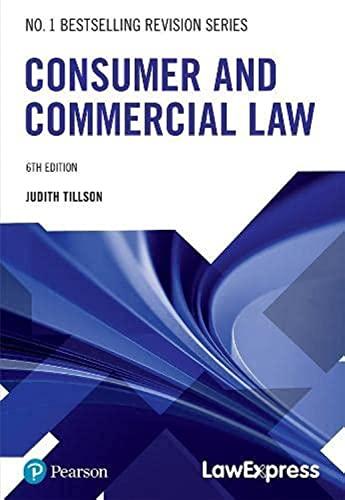Question
[ANALYSIS | Point of Law] Will the Ease of Doing Business Act do the trick? It takes an average of 13 procedures to start a
[ANALYSIS | Point of Law] Will the Ease of Doing Business Act do the trick?
It takes an average of 13 procedures to start a business, 9 procedures to register property, and 22 procedures to build a physical establishment in the Philippines
Francis Lim
Published 2:49 PM, November 05, 2019
Updated 2:49 PM, November 05, 2019
How difficult is it to do business in the Philippines in comparison to other economies?
In the 2020 Ease of Doing Business (EODB) Report, the Philippines ranked 95thamong 190 economies. Although this ranking was a significant improvement from last year's performance, the Philippines still ranks last among the founding members of the Association of Southeast Asian Nations (ASEAN). Singapore is ranked 2ndplace, Malaysia 12th, Thailand 21st, and Indonesia at 73rdplace.
Vietnam and Brunei, which are recent members in the Asean, have overtaken us at 66thand 70thplace, respectively.
According to the EODB Report, it takes an average of 13 procedures to start a business, 9 procedures to register property, and 22 procedures to build a physical establishment in the Philippines. Once the business has been set up, the company must make 13 annual tax payments. A business spends 43% of its profits for taxes. Furthermore, if a simple sales contract goes awry, it takes the seller 962 days from the time his collection case is filed to the time the court judgment is enforced. This is more than double the number of days in 8 of the 10 ASEAN countries, with only 164 days to resolve the same dispute in Singapore.
No wonder the Philippines has been lagging behind its ASEAN counterparts in attracting foreign direct investments (FDIs). Based on data from the Bangko Sentral ng Pilipinas (BSP), our total net FDIs amounted to only USD 22.9 billion from 2016 to the second quarter of 2019. Compare this figure with FDIs in Indonesia at USD 58 billion, Vietnam at USD 55.4 billion, Malaysia at USD 37 billion, and Thailand at USD 27 billion.
Worth highlighting is Singapore, which is a much smaller country with no natural resources like the other ASEAN countries. Consistently topping the EODB ranking among the ASEAN member states, Singapore has attracted USD 308 billion in net FDIs from 2016 to the second quarter of 2019.
Of course, the hallmark of Singapore is clean and efficient government service, which remains a dream for us Filipinos.
But not all hope is lost.
Quite recently, President Duterte appointed Jeremiah Belgica as Director-General of the Anti-Red Tape Authority (ARTA) to implement Republic Act No. (RA) 11032, more popularly called the "EODB Act."
Enacted in 2018, the new law introduced significant amendments to the Anti-Red Tape Act which, despite its enactment way back in 2007, has been ineffective in curbing red tape in government.
The EODB Act is anchored on a corruption-free delivery of government services in transacting with the public and the adoption of simplified procedures that support efficient government transactions.
Section 6 of the EODB Act requires a comprehensive and uniform checklist of requirements for each type of application or request to be added to the Citizen's Charter. Gone are the days where piecemeal requirements will be imposed. Section 7 provides for a Zero-Contact Policy, which prohibits a government officer or employee from having any contact with an applicant or requesting party and requires transactions to be coursed through a web-based software-enabled business registration system to be developed by the Department of Information and Communications Technology (DICT).
Section 9 of the law reduces the period within which applications or requests submitted to government offices or agencies shall be acted upon, from 5 to 3 days in simple transactions and from 10 to 7 days for complex transactions. The same section provides that highly technical applications and applications involving activities which pose a danger to public interest should be processed within 20 days.
The new law also provides for business one-stop shops (BOSS) to be implemented by local government units (LGUs) to receive and process applications for licenses, streamlined procedures for securing fire safety clearance and certification, the Central Business Portal, the Philippine Business Databank, and Interconnectivity Infrastructure Development under the DICT, the Anti-Red Tape Unit in the Civil Service Commission, the Anti-Red Tape Authority, and the Ease of Doing Business and Anti-Red Tape Advisory Council.
This new law is a welcome development for the private sector.
Of course, the enactment of a law is one thing and its proper implementation is another thing. So, the big challenge to the Director-General Belgca is whether, under his leadership, the EODB Act will do the trick for the country this time.
Let's keep our fingers crossed and more importantly, let's do our share to make the new law work.- Rappler.com
Requirements:
1. Based on the article above "Will the Ease of Doing Business Act do the trick?" identify one (1) major limitation in the implementation of the Ease of Doing Business Law and offer a solution to address it. And a small explanation.
2. Flowchart Preparation: Prepare a suggested flowchart of procedures in the issuance of local business licenses and permits in accordance with the provisions of Section 10-12 of the Ease of Doing Business Act.
Step by Step Solution
There are 3 Steps involved in it
Step: 1

Get Instant Access to Expert-Tailored Solutions
See step-by-step solutions with expert insights and AI powered tools for academic success
Step: 2

Step: 3

Ace Your Homework with AI
Get the answers you need in no time with our AI-driven, step-by-step assistance
Get Started


